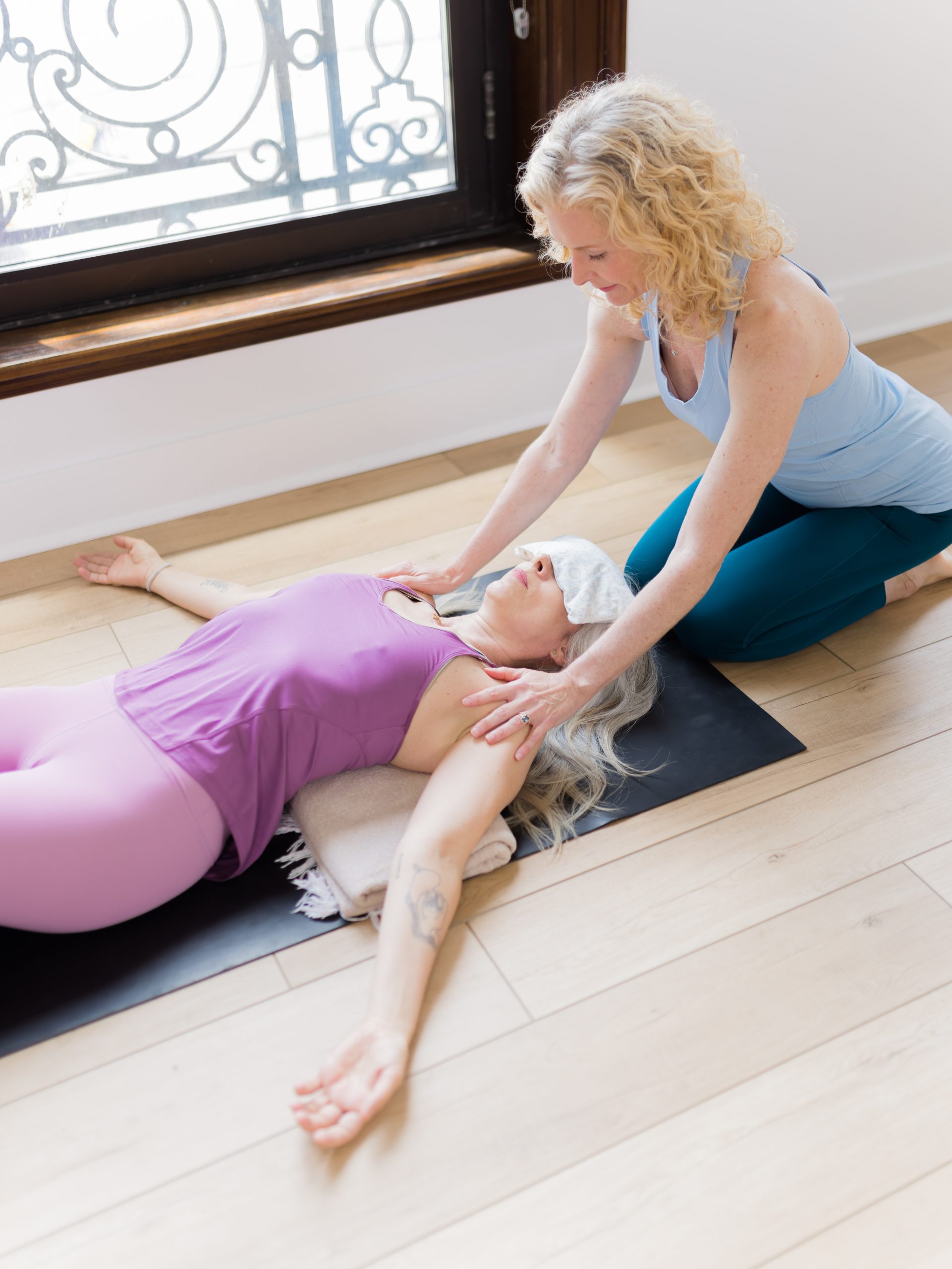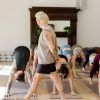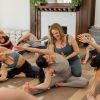
I have to admit I have a very “Type A” personality, which means that the idea of spending a significant amount of time in some kind of stillness never really appealed to me. I always felt like I needed to be doing something active to feel like I was getting some kind of physical benefit. It never occurred to me that I needed to work on restoring my physical body and my energy until I really began to feel burnt out.
I’d been working in New York City as a full time yoga teacher and I was running around a lot. Even Though I was teaching and practicing vinyasa yoga, I would come home and feel incredibly burnt out. Friends and family would always assume that I should be relaxed and calm because I taught and practiced yoga, but I was hitting a point where I’d never felt more tired and on edge in my life.
One evening, after years of avoiding it,I finally booked a restorative yoga class. The class began with a little bit of movement and then eventually we started to set up a bunch of props and were told to just relax. Immediately, my mind started to wander and I thought of all of the other things I could have been doing. Once those thoughts passed, I actually started to feel like I could unwind. I wasn’t too sure how long we were in the first pose, but it felt like just enough time for my mind to slow down and my body to let go.
The class continued on just like that. We’d set up in a restorative pose and remain in it for a period of time. Once that time was up, the teacher calmly took us out of the pose and instructed us into another. The class ended with the longest savasana I’d ever had, and I didn’t mind it one bit. When I got home, I felt like my head was much clearer and I felt like my body was rejuvenated. This was a feeling I’d been seeking for a very long time, but didn’t realize restorative yoga was the key to becoming more balanced. After that, I was hooked!
Restorative yoga may seem like a mysterious thing, but there are some really accessible ways to break it down:
Restorative yoga is a practice that helps the body integrate and heal
Restore means to recuperate or replenish. Yoga means union.
Through restorative yoga, you allow your body to reach a place of relaxation that brings together recuperation and replenishment. This creates the perfect environment for healing to take place. We all have the ability to heal, but a lot of us live in a high-stress or fast-paced environment. Whether it’s your office, your family, or your general living situation causing you to move out of balance, the stress or the lack of rest will eventually catch up to you and you’ll feel depleted. Restorative yoga is just what you need to finally pump the brakes and allow your body to rest and recharge.
Restorative yoga isn’t like vinyasa or hatha yoga
In both vinyasa yoga and hatha yoga, there is movement from one pose to the next and you’re on your feet for the majority of the class. In restorative yoga, the practice is focused strictly on rest and relaxation. Restorative yoga keeps you in one place and the majority of the class takes place on the ground. There are also a lot of props involved in the practice, which make the poses really comfortable and accessible to a wide range of people and to all different bodies.
You’re going to use yoga props
I have to admit that in my early days of practicing yoga, I used to think that needing a prop meant that I wasn’t doing great at something in the yoga practice. As I began to practice more and eventually teach, I realized that yoga props are like an extension of the practice. They’re helpful, supportive, and all around amazing!
If you’re in a restorative yoga class, you’re most likely going to use props like bolsters, blocks, blankets, straps, and chairs. Sometimes you’ll use only one or two of these props and other times you’ll use all of them. The props are used to help promote the deepest level of relaxation to alleviate the effects that stress has left. This will bring your body to a place where it can tap into its natural resources to establish equilibrium.
The goal of restorative yoga is to establish self-regulation in your body.
The point of restorative yoga
Unlike other forms of yoga where the goal may be to stretch or strengthen your muscles, restorative yoga’s goal is to bring your body to a place where it can find homeostasis, or balance. If you think about it, a lot of the physical activities you do may actually take your body out of balance so it can become stronger. This is great to do as long as you’re also doing something that gives your body the time and space to recover and heal.
You may also live in an environment that has a lot of mental or emotional stress, which are things that you need the time and space to come back to balance from. Your body and your nervous system need a way to rest and recover. Restorative yoga gives these things to you so you can feel well. It’s always shocking to me that more people aren’t taking restorative classes these days!
Restorative yoga poses are easily adaptable
With the use of props, almost everyone can practice restorative yoga. The poses are designed to meet you where you are, so you can take a restorative class at almost any time! Unlike many other styles of yoga, you can adjust the poses to fit you and accommodate your needs for the day or for anything that may be going on in your body.
I’ve practiced restorative yoga when I’ve pushed my body too far, when I’ve been injured, when I’ve been tired, and when I’ve been over-stimulated. Each time, the poses have helped me move away from any extremes I was feeling in my body or mind and return to a place where I was centered and well. Since the poses can be easily adapted, they can sometimes also be done anywhere and for as long as you need.
Sometimes, you only need five minutes
My favorite thing about restorative yoga is that you don’t need to dedicate a full hour to it if you don’t have the time. In fact, if you feel like you need to have another cup of coffee during an afternoon slump, you can take about five minutes to come into one restorative pose instead. This can help your body rest and work like a natural reset.
Poses such as supported backbends and supported twists can be taken on those coffee breaks, before you pick up the kids, or when you get home from work to energize yourself and show up a little bit brighter for your family and loved ones. Giving yourself a few moments to take care of yourself is something the restorative practice offers and encourages. If you have more time to practice a full-length class, great! But you don’t always need to!
A full length restorative class will give you many of the same benefits as a vinyasa or hatha class
If you teach vinyasa or hatha classes, you probably already know the concept of a well rounded class. This often means that you are moving your spine in all directions. There is also a beginning, middle, and end. You will move forward and back, side to side, and lateral.
Energetically, your body and mind will start to clear away what isn’t serving it and will begin to align with what is. This is something you experience while in class, on your yoga mat. Then, you’ll be able to take these benefits with you out into the world and into your relationship with yourself and the people around you.
You will truly understand Savasana
In a restorative yoga class, you may practice Savasana for up to twenty minutes. This may sound either like a luxury or like torture. The more you practice and embrace restorative yoga, the more luxurious Savasana becomes! Restorative teachers are trained to notice when students are experiencing frustration, restlessness, fatigue, or discomfort. They’re able to help you set up this final resting pose for you to be in a place where you’re receiving all of its benefits.
Restorative teachers know that relaxation can be harder than it looks and they’re trained to assist you in finding what works for you.
Want to learn more about restorative yoga?
Whether you’d like to teach restorative or simply learn more about the practice and the different ways to structure a class for yourself and your practice, we have a training that we just know you’ll love! Check out our restorative yoga teacher training with Joanne Silver and Keely Garfield today!







